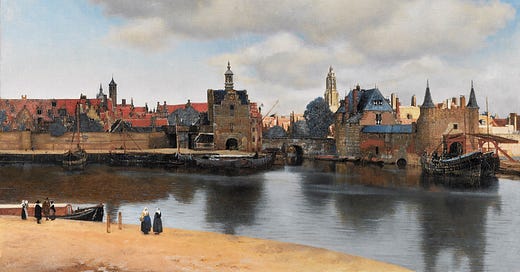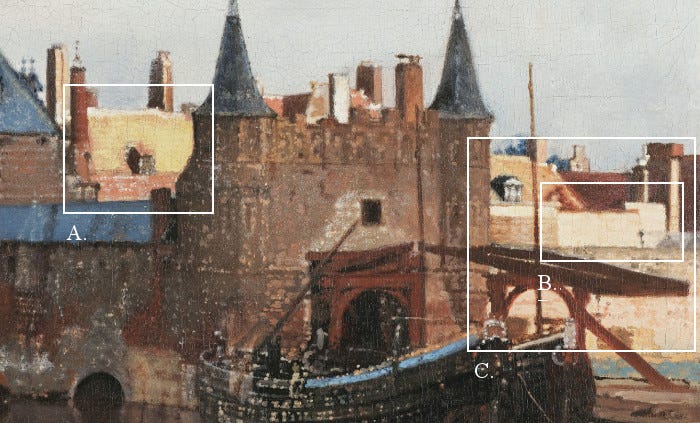Proust’s A la recherche du temps perdu is one of the great novels ever written about paintings. And perhaps most unforgettable (at least for me) is what he wrote about Vermeer’s View of Delft, when Bergotte, the narrator’s favorite author, drags himself out to see the work on the day he dies.
He nearly doesn’t make it, suffering from a massive dizzy spell.
But he knows it is important and so picking himself up, he forges on to the museum. Making his way past several other pictures which he finds pointless and vacuous, he finally arrives in front of Vermeer’s Delft.
And Shazam!
Before heading out, he’d been primed to locate a certain stretch of yellow in the work by a review he’d read before leaving his apartment. It was concerned with a patch of yellow wall in the picture “so well painted that it was, if one looked at it by itself, like some priceless specimen of Chinese art, of a beauty that sufficed by itself.”
This is when Bergotte says those haunting words about art and life:
“That’s how I ought to have written,” he said. “My last books are too dry, I ought to have gone over them with a few layers of color, made my language, precious in itself, like this little patch of yellow wall.” Meanwhile, he was not unconscious of the gravity of his condition. In a celestial pair of scales there appeared to him, weighing down one of the pans his own life, while the other contained the little patch of wall so beautifully painted in yellow. He felt that he had rashly sacrificed the former for the latter… He repeated to himself “little patch of wall, with a sloping roof, little patch of yellow wall.
Proust loved the painting and in real life had traveled to Holland to see it in 1902, thereafter considering it to be the best painting in the world.
But where is the little patch of yellow wall?
I suppose it doesn’t matter.
We always read these articles online, at least I do anyway, of what people regret as they are dying and how it’s always the same: more time sharing meals with family, more time in nature, more time spent with friends— but what about regrets about not living up to our ideals.
For Proust, he was glad to have sacrificed “his life” for art. I am reading a fantastic art memoir right now by Pulitzer Prize winning author Benjamin Moser. Moving to Holland when he is a young aspiring writer, he struggles at first to find his place in a strange land… and it is art that provides the entry for him—especially Dutch Golden Age painting. His words about Proust and Vermeer are very moving (and I truly loved this gorgeous book):
Vermeer died at forty-three and Proust at fifty-one. I had no expectation of living up to their standard, but I still felt encouraged by its existence. I thought it nobler to aspire to their urge to self sacrifice —to bear in mind those scales. I recalled their admonishment to prefer the little patch of yellow wall to life itself. I didn’t; I hadn’t. But one oughtn’t be depressed for failing to live up to ideals. When ought to be depressed by not having tried!
And finally speaking of art as life’s great consolation, and this is something explored throughout Moser’s memoir, I am also reading Ferdia Lemmon’s Waterstone Debut Prize winning novel, Glorious Exploits. Set in 412 BC during the Peloponnesian war, the story begins when two out of work potters start spending time in the deadly mines of Syracuse where thousands Athenian war prisoners are being worked to death. The suffering in the mines recalls things one reads about the death camps in WWII— and because it was Athens who attacked Syracuse, causing tremendous human loss, the the people of Syracuse think nothing of inflicting great cruelty onto the prisoners…. that is until these two potters decide that they want to use the prisoners—who after all come from glorious Athens, the seat of what was the greatest culture in the world, to put on a full-blown production of Medea.
The author in an interview said the idea came to him when reading a description in Plutarch of how some of those defeated Athenians survived by quoting lines from Euripides, the most popular dramatist amongst the Sicilians. He said:
I thought, OK, that’s my story: who were these Syracusans who left Athenian prisoners to die in this open-air pit, yet were so fascinated by their drama that they’re willing to save them in exchange for these precious lines?
The book is brilliant.
I love historical fiction told in a modern voice and this one is in contemporary Dublin slang.
Do you have a favorite painting in the world? For me the “best picture in the world” is Resurrection by Piero della Francesca. But I’ve never been to Delft!
The Upside-Down World: Meetings with Dutch Masters, by Benjamin Moser
Glorious Exploits, by Ferdia Lennon
Paintings in Proust, by Eric Karpeles
Thunderclap, by Laura Cummings







Oh, my! How fortunate to read two pieces by you in one day! Your gift: a little patch of yellow wall.